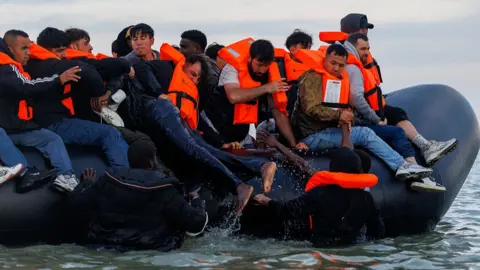The recent increase in small boat crossings across the English Channel has become a significant political issue in the UK. According to recent Home Office data, the number of people making this perilous journey has reached nearly 50,000 since the Labour Party came to power last summer. Figures indicate that as of Sunday, 49,797 individuals had crossed the Channel, highlighting a growing migration trend that has raised concerns among government officials and citizens alike.
Baroness Smith, a home office minister, responded to the statistics by expressing that the volume of crossings is “unacceptable,” while also pointing to a “one in, one out” policy established with the French government as a potential deterrent to these crossings. Under this agreement, the UK aims to return some migrants to France while receiving a corresponding number of asylum seekers who fit the criteria for legitimate claims.
The Conservative Party has vehemently criticized the current Labour government, arguing that the overwhelming numbers of migrants reflect a serious lapse in border security policy. They claim that the government has effectively “surrendered our borders” and positioned the country in a vulnerable state concerning illegal immigration. This divergence in narrative highlights the current political climate and the mounting pressure on the government to address the issue effectively.
Moreover, concerns regarding organized crime have surfaced as officials continue to grapple with disbanding people-smuggling networks, which have gained significant traction in recent years. Baroness Smith acknowledged the troubling emergence of these gangs involved in human trafficking, noting that their operations have taken a strong foothold and require serious governmental intervention. She insisted that the government is making headway in combating these illicit networks while affirming that the situation is concerning to many.
The announcement of the “one in, one out” pilot scheme comes amidst a backdrop of escalating discussions on additional measures the government plans to develop. This includes proposed prison sentences of up to five years for individuals involved in promoting illegal crossings, along with enhanced resources for the National Crime Agency. A recent report cited that multiple individuals have been detained under the new agreement with France, although specific numbers were not disclosed.
Looking at data trends, the number of small boat crossings since Labour assumed power shows a notable increase compared to the previous year. During the comparable period a year prior, from July 5, 2023, to August 11, 2024, there were approximately 36,346 migrant crossings. It is worth mentioning that during a 403-day span from October 8, 2021, to November 14, 2022, under the previous Conservative administration, there were 53,587 entries via small boats.
The variable weather has also been cited as a contributing factor to the rising numbers, as unusually calm and warm conditions at the start of the year facilitated crossings. However, critics from the Conservative Party have labelled the current crisis as a failure of Labour’s immigration policy, coining this situation as the “worst illegal immigration crisis in our history.” Shadow home secretary Chris Philp emphasized that taxpayers are essentially funding a “ferry service for people-smuggling trade.”
While the political ramifications of reaching the 50,000 milestone could present challenges for the Labour government, it equally highlights the urgent need for comprehensive policy changes that can effectively address unauthorized migration. Plans proposed by the Home Office encompass a wider strategy aiming to decrease illegal work and streamline the deportation process for foreign criminals.
While the government is looking to tighten its border security, voices from organizations such as the Refugee Council stress that the individuals who risk crossing the Channel often do so out of desperation. Enver Solomon, the charity’s chief executive, stated that many are fleeing dire circumstances in their countries, such as war-torn regions like Sudan. To put an end to the smuggling crisis, Solomon argues that the UK must expand safe and legal routes for migration.
As the debate surrounding the management of immigration continues, it remains clear that the challenge ahead for the UK government is complex, and the solutions presented will require a multifaceted approach to ensure the safety and well-being of all individuals involved.











